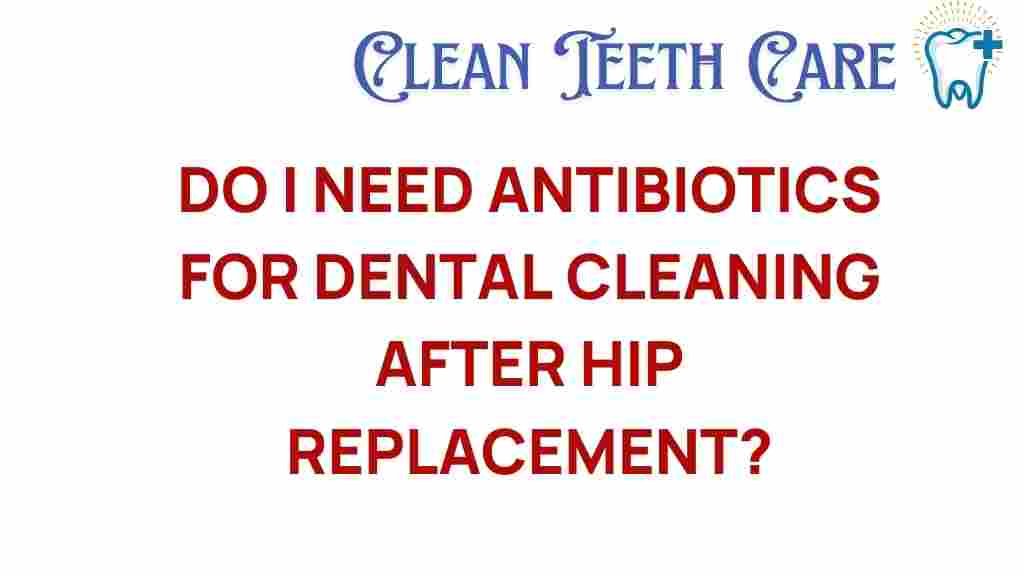Do You Really Need Antibiotics for Dental Cleaning After Hip Replacement?
When it comes to maintaining dental health, patients often wonder about the potential risks associated with dental procedures following major surgeries, such as hip replacement. One of the most frequently asked questions is whether antibiotics are necessary before dental cleaning after undergoing orthopedic surgery. This article will explore the guidelines surrounding antibiotics, the infection risk associated with dental cleaning after hip replacement, and what patients can do to ensure their safety.
Understanding the Connection Between Dental Health and Hip Replacement
After a hip replacement, patients face an increased risk of certain infections. This is primarily due to the presence of foreign materials in the body, which can serve as potential sites for bacterial colonization. Dental procedures, particularly those that involve manipulation of the gums, can introduce bacteria into the bloodstream, raising concerns about the risk of infection in the prosthetic joint.
The Importance of Dental Health
Dental health is crucial not only for maintaining a bright smile but also for overall well-being. Poor dental hygiene can lead to gum disease, which has been linked to various systemic health issues. For individuals with hip replacements, maintaining optimal dental health is essential to minimize infection risks.
Guidelines for Antibiotic Prophylaxis
The American Dental Association (ADA) and the American Academy of Orthopaedic Surgeons (AAOS) have provided specific guidelines regarding antibiotic prophylaxis for patients with joint replacements. Understanding these guidelines can help patients and healthcare providers make informed decisions about the necessity of antibiotics before dental cleaning.
- High-Risk Patients: Patients with certain medical conditions, such as immunocompromised states or those with a history of joint infections, may require antibiotics before dental procedures.
- Standard Patients: Most patients with hip replacements do not need antibiotics before routine dental cleanings.
- Consultation Required: It’s essential for patients to consult their orthopedic surgeon and dentist to determine the need for antibiotics based on individual health circumstances.
Infection Risk and Hip Replacement
After hip replacement surgery, the risk of infection can be heightened. Here are some factors that contribute to this elevated risk:
- Prosthetic Joint: The presence of artificial materials can lead to a higher likelihood of infections.
- Dental Procedures: Procedures that involve gum manipulation can introduce bacteria into the bloodstream.
- Underlying Health Conditions: Conditions such as diabetes or a weakened immune system can increase infection susceptibility.
Preventative Measures
To mitigate infection risks, patients should adopt various preventative measures, especially before undergoing dental cleaning:
- Maintain Oral Hygiene: Regular brushing and flossing can help reduce bacteria in the mouth.
- Regular Dental Check-ups: Schedule routine visits with a dentist to monitor dental health.
- Inform Healthcare Providers: Always inform dental and medical providers about your hip replacement and any other medical history.
Step-by-Step Process: What to Do Before Dental Cleaning
Here’s a step-by-step process to follow before undergoing dental cleaning after hip replacement:
- Consult Your Healthcare Providers: Before scheduling a dental cleaning, consult with both your dentist and orthopedic surgeon to discuss your specific situation and any necessary precautions.
- Review Your Medical History: Make sure your healthcare providers have an updated and accurate medical history, including your hip replacement details.
- Discuss Antibiotic Prophylaxis: Determine if you need antibiotics based on your health status and the type of dental procedure.
- Schedule Regular Dental Cleanings: Aim for routine dental cleanings every six months to maintain optimal dental health.
Troubleshooting: What If You Experience Symptoms?
After dental cleaning or any dental procedure, it’s essential to watch for any signs of infection. Here are some symptoms to be aware of:
- Fever: A sudden increase in body temperature can indicate an infection.
- Swelling: Noticeable swelling around the hip joint or surgical site may be a red flag.
- Pain: Increased pain in the hip or groin area, beyond the normal post-operative discomfort, should be addressed immediately.
If you experience any of these symptoms, contact your healthcare provider promptly for evaluation and potential treatment.
Conclusion: Prioritizing Patient Safety
In conclusion, while the risk of infection after hip replacement is a valid concern, routine dental cleaning does not typically require antibiotic prophylaxis for most patients. Adhering to the guidelines set forth by the ADA and AAOS, along with maintaining good oral hygiene and regular dental visits, can significantly enhance patient safety and reduce the likelihood of complications.
Always remember that each patient’s situation is unique. It’s crucial to maintain open communication with your healthcare providers to ensure that you make the best decisions for your health. If you’re unsure about your need for antibiotics before dental cleaning, consult with your healthcare team for personalized advice.
For more information about the connection between dental health and orthopedic surgery, visit this resource to further understand how to manage your health effectively.
This article is in the category Treatments and created by CleanTeethCare Team
